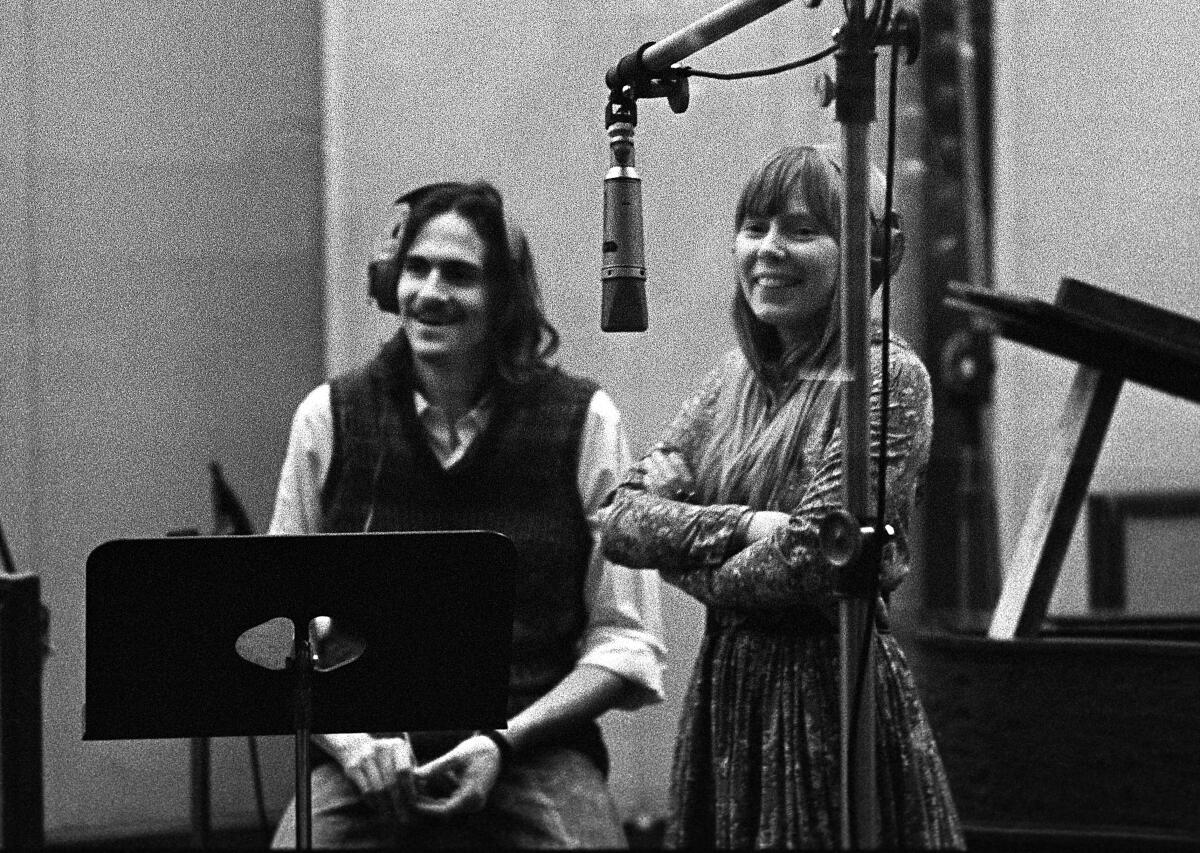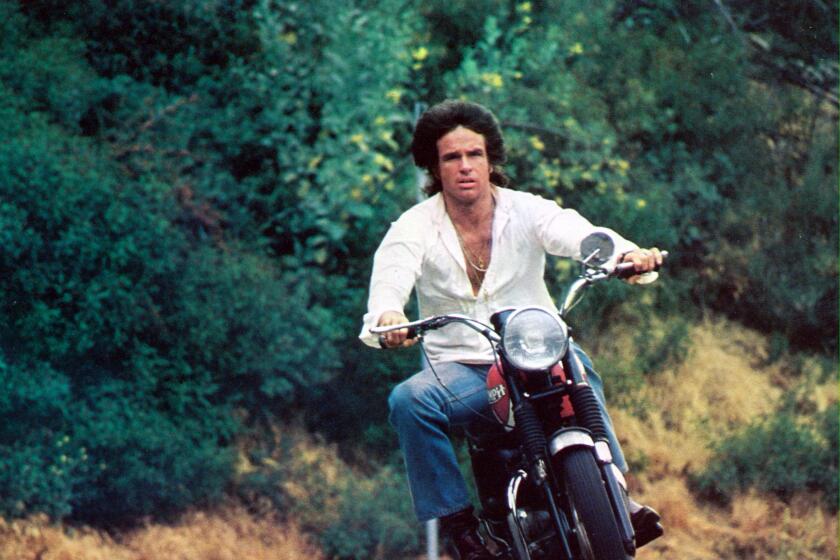Review: The Joni Mitchell-James Taylor saga makes for a potent novel that stands on its own
On the Shelf
Songs in Ursa Major
By Emma Brodie
Knopf: 336 pages, $27
If you buy books linked on our site, The Times may earn a commission from Bookshop.org, whose fees support independent bookstores.
It’s a tricky business, basing a novel on a real-life relationship between two people. Obsessives will demand facts rather than fiction. Hew too closely to the record, however, and you choke off the imagination.
Emma Brodie toes this line with zest and balance in her debut novel, “Songs in Ursa Major.” The book is very much based on the love affair and mutual muse-hood of Joni Mitchell and James Taylor, leading lights of the folk-rock world and onetime residents of L.A.’s Edenic Laurel Canyon. But from the very start, it stretches out and becomes its own thing. Brodie works with big themes — individuation, mental illness, legacy, self-destruction and redemption — but her touch is lighter than an onshore breeze. Little surprise that Village Roadshow has scooped the novel up for development as a movie.
Jane Quinn lives on a sleepy Northeastern island, “a stone’s throw off the coast of Massachusetts,” with her extended family. It’s 1969 and she leads a band, the Breakers, that performs in relative anonymity. That changes fast when budding superstar Jesse Reid wrecks his motorcycle en route to the Island Folk Fest. In a jam, festival organizers pluck the Breakers from the amateur stage down the hill. An A&R guy catches the set. And, as in the movies, a star is born.
“What a range,” thinks (fictional) Rolling Stone reporter Curtis Wilks as he watches the show. “A soprano, in the school of Joan Baez and Judy Collins, though not nearly as patrician-sounding as Collins, or as embattled as Baez. There was an untrained edge in her voice, an almost Appalachian coarseness, that raised the hair on Curtis’s neck. Just gorgeous.”
Brodie, formerly an editor at Little, Brown, has a wicked knack for locating the tone of various music types: journalists, producers, A&R scouts and, of course, prodigiously talented singer-songwriters. Except Jane, as they say, is different. Bold but vulnerable, whip-smart and earthy, she’s easy to root for from the moment she takes the stage at that first big show.
Excited to get a shot, she’s also wary of what the music industry might do to her. Jane is especially hesitant as she’s drawn into the orbit of Jesse, who is recovering from the motorcycle crash on the island. Jane wants success on her terms, and as she falls hard for Jesse, she also wants to keep some emotional distance from a man who always seems just out of reach.
In a rare interview, Joni Mitchell talks with Cameron Crowe about the state of her singing voice and the making of “Blue,” 50 years after its release.
You can tell when a novelist truly loves her heroes and despises her villains. As Jane fights to get her due in a man’s, man’s, man’s world, navigating the experiences that eventually inform her equivalent of Mitchell’s breakthrough album, “Blue” (whose 50th anniversary falls on the day of this book’s release), you can feel Brodie pulling to lift her above the crowd.
But “Ursa Major” is plotted so tightly, its characters so vividly rendered, that you barely notice the author’s thumb on the scale. Jane, with all her insecurities and appetites, is no more perfect than any other character here; one extended sequence finds her seducing a photographer and throwing him away. Yet Brodie lets you know that in her essence, she is special. As that Rolling Stone scribe puts it, “Her loveliness felt personal — it was impossible to look at her and not take flight in some small part of you.”
Of course, every hero needs a villain. Brodie’s is Vincent Ray, an allegedly visionary producer who can’t stomach the idea of a female artist having her own ideas. He lays as many traps for Jane as he can, always looking for a way to derail her career. You feel a cold blast every time he enters a scene and asserts himself with alpha male mind games. His presence makes you cheer for Jane even harder.
As the Breakers hit the road for a cross-country bus tour with Jesse and his band, Jane’s character arc and irony-rich dilemma come into sharp focus. Her A&R rep, Willie, wants her to play the fame game and tantalize the press with are-they-or-aren’t-they clues about her and Jesse. He wants her to sell albums. He also wants her to play security blanket for the established star.
Jesse is a heroin addict, as Taylor was — a secret he’s grown adept at keeping. It seems that to advance her career, Jane must suppress her art and her soul. Brodie never has to come out and explain this dynamic, because she so deftly dramatizes it.
We asked 10 of our favorite artists to each choose one track from Joni Mitchell’s ‘Blue’ and describe what makes the song and artist so indelible.
“Songs in Ursa Major” also weaves in a deep understanding of the connection between creativity and madness. Jesse was (also like Taylor) a patient at the McLean Hospital in Belmont, Mass.; he wrote a song, “Sylvie Smiles,” about fellow patient Sylvia Plath (“She’ll be Venus if you’ll be Mars/Catch her in a glass bell jar”). More pertinent to the story, Jane’s mother, Charlotte, suffered a psychotic break years ago; a fellow songwriter, she was broken partly by another musician who stole her best song. This sounds like a minefield of clichés; in Brodie’s hands, it’s a rich crop of lived-in details that link one character to another over multiple generations.

There’s something about “Ursa Major” that suggests a mythology, a hero’s journey in which the hero is a woman with immense musical gifts and the music business is a beast to overcome and master. Jane isn’t just a rising rock star; she’s also a sort of superhero, and this is her origin story. If anything, that story ends too quickly. By the time it jumps ahead in time for an epilogue of sorts, it feels like there’s still unfinished business — between Jane and Jesse, between Jane and her art, between Jane and the world.
If you want to play a game of “Where’s Joni” with the novel, you can always pick up David Yaffe’s 2017 biography, “Reckless Daughter: A Portrait of Joni Mitchell.” But “Songs in Ursa Major” deserves to be enjoyed as is, without connecting the dots. Fiction, after all, is fiction. Brodie is very good at it, and — like Joni and like Jane — a voice well worth listening to.
Three new books — “Dream State,” “Hollywood Eden” and “Rock Me on the Water,” examine savvy pop-culture myth-making by and about the Golden State.
Vognar is a freelance writer based in Houston.
More to Read
Sign up for our Book Club newsletter
Get the latest news, events and more from the Los Angeles Times Book Club, and help us get L.A. reading and talking.
You may occasionally receive promotional content from the Los Angeles Times.







